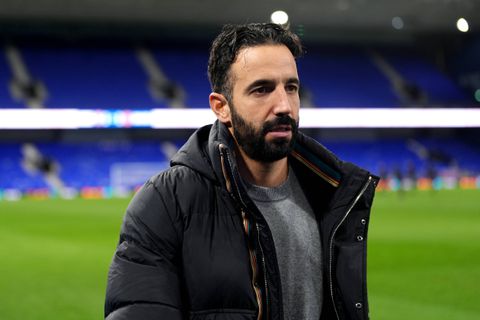Ruben Amorim’s tenure as Manchester United manager began with a 1-1 draw against struggling Ipswich Town in the Premier League on Sunday. Despite Marcus Rashford giving United an early lead, Omari Hutchinson’s deflected strike equalized for the hosts before halftime, leaving the Red Devils without a win in their new manager’s first match.
The draw highlighted the challenges Amorim faces in turning around a team currently sitting in 12th place in the league. After the match, the former Sporting Lisbon coach emphasized the need for time, patience, and significant tactical and physical improvements to guide Manchester United back to their best.
United’s Struggles Under Amorim’s 3-4-3 System
Amorim deployed his signature 3-4-3 formation, the same system that brought him success in Portugal, winning two Primeira Liga titles with Sporting Lisbon. However, the lack of preparation time with the squad was evident as United struggled to adapt to the tactical demands of the system.
“It is hard with just two days. Everyone talks about the 3-4-3, but that is not the concern. A system is a system, but the understanding of the game we have to improve a lot in this area,” Amorim explained post-match.
United started the game brightly, with Rashford scoring in the second minute after a swift attack led by Amad Diallo. However, the team’s inability to maintain control and composure became apparent as Ipswich grew into the game. Hutchinson’s equalizer, aided by a deflection, epitomized the defensive lapses that continue to plague United’s performances.
– Ruben Amorim:
“We have TWO ways — forget about the new idea and try to cope so next year we have the same problem.”
“Or start NOW, risk and suffer a little bit, and then next year we’ll be better at this point.”
THIS IS WHY HE WILL SUCCEED!!pic.twitter.com/6dcyJyjupK
— UF (@UtdFaithfuls) November 25, 2024
Amorim Highlights Fear and Confusion Among Players
The Portuguese manager pointed out his team’s hesitation and lack of confidence on the pitch.
“My players were thinking too much during the game. You can feel it—not just on the ball but where they are supposed to be on the pitch. If you see the first half, we were a little bit afraid,” Amorim admitted.
The lack of cohesion was evident as United struggled to control the tempo despite taking an early lead. Their transitions were often sluggish, and misplaced passes created opportunities for Ipswich to counter.
“When you start like this with one goal, you have to control the tempo. We cannot do it at the moment, but they really tried,” he added.
Physicality and Tactical Awareness: Key Areas for Improvement
Amorim underlined the importance of improving United’s physical conditioning to handle the rigors of the Premier League, as well as enhancing their tactical awareness.
“First, they have to understand the game, then they need to be so much better physically to cope with the high pressure,” Amorim said. “We need time to work on this. They want this, but sometimes they don’t know how to get it. That is my feeling.”
The new manager also acknowledged the challenges of instilling his footballing philosophy while balancing immediate results.
“We have two ways. We try to just win games and don’t risk anything, but then I guarantee at this stage next year we would have the same problems. So now we will have some problems, but we have to address the new idea and try to be better at the same stage next year,” Amorim explained.
Promising Signs Despite Frustrations
Amorim praised his players’ work rate and commitment, despite the imperfections in their performance. United created several chances but were denied a winner by Ipswich’s solid defending and a couple of key saves from the opposition goalkeeper.
The decision to field Amad Diallo as a right wing-back and Marcus Rashford in a central role paid dividends early on, with the latter scoring his first goal under the new boss. Rashford’s goal demonstrated the potential of Amorim’s tactical tweaks, even if the overall execution remains a work in progress.
Building Towards Long-Term Success
While the result was disappointing, Amorim’s post-match comments emphasized his commitment to building a foundation for sustained success rather than seeking short-term fixes.
“The understanding of the game, the physicality, the confidence—they are not where they need to be yet. It is a process, and we have to accept that,” Amorim said.
He also stressed the importance of utilizing upcoming training sessions to instill his ideas and refine the team’s performance. With United facing a packed schedule, including a crucial midweek fixture against a high-flying Newcastle side, Amorim will need to balance tactical development with the demands of immediate competition.
What’s Next for Manchester United?
Amorim’s Manchester United project is clearly in its infancy, and while there are significant areas for improvement, there is also a sense of cautious optimism. His track record at Sporting Lisbon, where he transformed the club into title contenders, provides hope for United fans that he can replicate similar success at Old Trafford.
With the team struggling for consistency and confidence, patience will be critical. The next few weeks will be pivotal in determining how quickly Amorim can implement his philosophy and guide United up the Premier League table.
READ NEXT:


